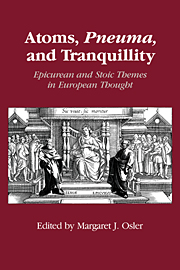Book contents
- Frontmatter
- Contents
- List of contributors
- Acknowledgments
- Introduction
- 1 Ethics and logic in Stoicism
- 2 Medieval connectives, Hellenistic connections: the strange case of propositional logic
- 3 Stoic psychotherapy in the Middle Ages and Renaissance: Petrarch's De remediis
- 4 Alonso de Cartagena and John Calvin as interpreters of Seneca's De clementia
- 5 The Epicurean in Lorenzo Valla's On Pleasure
- 6 Seneca's role in popularizing Epicurus in the sixteenth century
- 7 Stoic contributions to early modern science
- 8 Fortune, fate, and divination: Gassendi's voluntarist theology and the baptism of Epicureanism
- 9 Epicureanism and the creation of a privatist ethic in early seventeenth-century France
- 10 Robert Boyle on Epicurean atheism and atomism
- 11 Stoic and Epicurean doctrines in Newton's system of the world
- 12 Locke, Willis, and the seventeenth-century Epicurean soul
- 13 The Epicurean new way of ideas: Gassendi, Locke, and Berkeley
- 14 The Stoic legacy in the early Scottish Enlightenment
- Index
Introduction
Published online by Cambridge University Press: 13 November 2009
- Frontmatter
- Contents
- List of contributors
- Acknowledgments
- Introduction
- 1 Ethics and logic in Stoicism
- 2 Medieval connectives, Hellenistic connections: the strange case of propositional logic
- 3 Stoic psychotherapy in the Middle Ages and Renaissance: Petrarch's De remediis
- 4 Alonso de Cartagena and John Calvin as interpreters of Seneca's De clementia
- 5 The Epicurean in Lorenzo Valla's On Pleasure
- 6 Seneca's role in popularizing Epicurus in the sixteenth century
- 7 Stoic contributions to early modern science
- 8 Fortune, fate, and divination: Gassendi's voluntarist theology and the baptism of Epicureanism
- 9 Epicureanism and the creation of a privatist ethic in early seventeenth-century France
- 10 Robert Boyle on Epicurean atheism and atomism
- 11 Stoic and Epicurean doctrines in Newton's system of the world
- 12 Locke, Willis, and the seventeenth-century Epicurean soul
- 13 The Epicurean new way of ideas: Gassendi, Locke, and Berkeley
- 14 The Stoic legacy in the early Scottish Enlightenment
- Index
Summary
This volume is the product of a conference on “Epicureanism and Stoicism,” sponsored by the Calgary Institute for the Humanities, held 24–27 March 1988. Bringing together scholars from several countries and a variety of disciplines, the conference addressed the question of the influence that Epicureanism and Stoicism – two philosophies of nature and human nature articulated during classical antiquity – exerted on the development of Western European thought from ancient times to the Enlightenment. Although the influence of these philosophies has often been noted in certain areas – for example, the influence of Stoicism on Christian thought, and the influence of Epicureanism on modern materialism – the essays in this volume make us newly aware of the degree to which these philosophies and their continued interaction informed European intellectual life, well into early modern times. Even then, many thinkers continued to perceive these two ancient schools as significant alternatives for understanding the human and the natural worlds.
Stoicism and Epicureanism arose more or less contemporaneously in Athens in the late fourth century b.c. Both Epicurus (341–271 b.c.) and Zeno of Citium (334–262 b.c.) developed their philosophies in reaction to the prevailing schools of Plato and Aristotle which dominated Greek thought at that time. The Epicureans and the Stoics alike had Roman expositors whose writings facilitated the transmission of their thought into the medieval period and beyond. Cicero (106–43 b.c.) discussed Epicureanism and Stoicism in several influential works, such as the Tusculans, De finibus, De natura deorum, De divinatione, and De fato.
- Type
- Chapter
- Information
- Atoms, Pneuma, and TranquillityEpicurean and Stoic Themes in European Thought, pp. 1 - 10Publisher: Cambridge University PressPrint publication year: 1991
- 2
- Cited by

